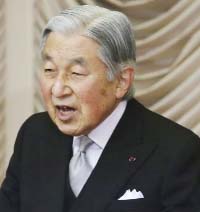
AP, Tokyo :
A government panel studying a possible abdication of Japanese Emperor Akihito is to release a report Monday that supports enacting special legislation that would apply to him but not to future monarchs.
The panel is looking at how to accommodate Akihito’s apparent abdication wish, which he expressed last August when he cited concerns that his age and health may start limiting his ability to fulfill his duties. Akihito turned 83 last month.
The report to be released Monday evening will pave the way for a parliamentary discussion. Its primary positions were disclosed in media reports during the day, but the emperor’s title, role and other details of his post-abdication life would be addressed later.
The six-member panel, after interviewing constitutional and monarchy experts, agreed that allowing an abdication was the most appropriate way to meet Akihito’s request, but that setting a permanent system covering all future emperors would be difficult.
If legislation is enacted, Emperor Akihito would be the first to abdicate since Emperor Kokaku 200 years ago.
Panel members have said they planned to include various opinions.
Some experts have said the Imperial House Law, the supreme law overseeing Japan’s monarchy, needs to be revised.
The current law, established in 1947, is largely inherited from a 19th century constitution that banned abdication as a risk to stability. But the experts said there was no such risk in today’s political system.
Throughout much of its history, Japan’s monarchy served more of a ceremonial and religious function than a governing one. But late 19th century modernizers elevated the throne to use as a rallying point for the nation.
Akihito’s father was worshipped as a living god during Japan’s wartime aggression in Asia before renouncing his divinity and become redefined as a symbolic figure under the postwar constitution. Akihito devoted himself to being a symbolic figure, while trying to soothe the wounds from his father’s era.
Many Japanese ultra-conservatives want greater status for the emperor and oppose abdication as a potential risk to a stable monarchy.
The government panel in its report avoids some of the most heated issues, such as whether females should be allowed in the current male-only succession and concerns about a shortage of successors to the Chrysanthemum throne. Akihito has two sons but only one of his four grandchildren is male.
A government panel studying a possible abdication of Japanese Emperor Akihito is to release a report Monday that supports enacting special legislation that would apply to him but not to future monarchs.
The panel is looking at how to accommodate Akihito’s apparent abdication wish, which he expressed last August when he cited concerns that his age and health may start limiting his ability to fulfill his duties. Akihito turned 83 last month.
The report to be released Monday evening will pave the way for a parliamentary discussion. Its primary positions were disclosed in media reports during the day, but the emperor’s title, role and other details of his post-abdication life would be addressed later.
The six-member panel, after interviewing constitutional and monarchy experts, agreed that allowing an abdication was the most appropriate way to meet Akihito’s request, but that setting a permanent system covering all future emperors would be difficult.
If legislation is enacted, Emperor Akihito would be the first to abdicate since Emperor Kokaku 200 years ago.
Panel members have said they planned to include various opinions.
Some experts have said the Imperial House Law, the supreme law overseeing Japan’s monarchy, needs to be revised.
The current law, established in 1947, is largely inherited from a 19th century constitution that banned abdication as a risk to stability. But the experts said there was no such risk in today’s political system.
Throughout much of its history, Japan’s monarchy served more of a ceremonial and religious function than a governing one. But late 19th century modernizers elevated the throne to use as a rallying point for the nation.
Akihito’s father was worshipped as a living god during Japan’s wartime aggression in Asia before renouncing his divinity and become redefined as a symbolic figure under the postwar constitution. Akihito devoted himself to being a symbolic figure, while trying to soothe the wounds from his father’s era.
Many Japanese ultra-conservatives want greater status for the emperor and oppose abdication as a potential risk to a stable monarchy.
The government panel in its report avoids some of the most heated issues, such as whether females should be allowed in the current male-only succession and concerns about a shortage of successors to the Chrysanthemum throne. Akihito has two sons but only one of his four grandchildren is male.

